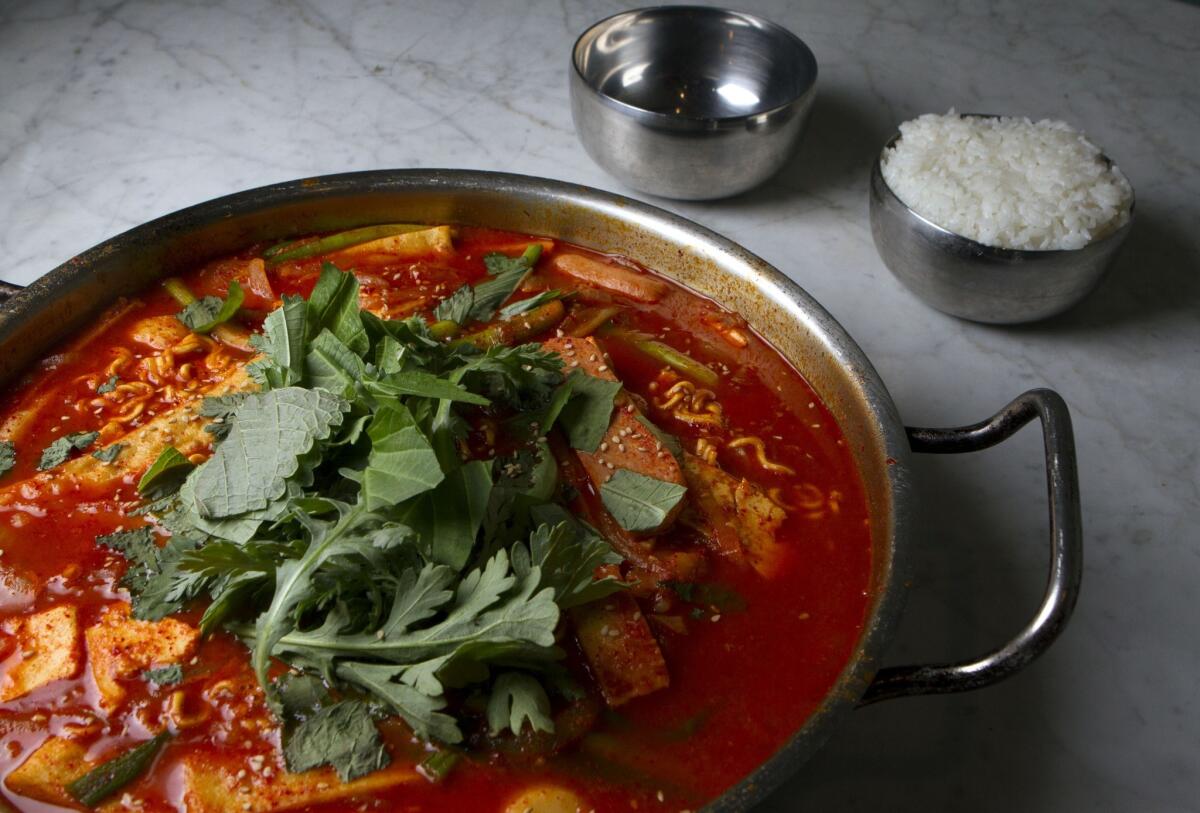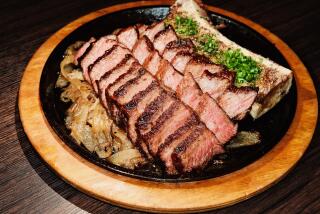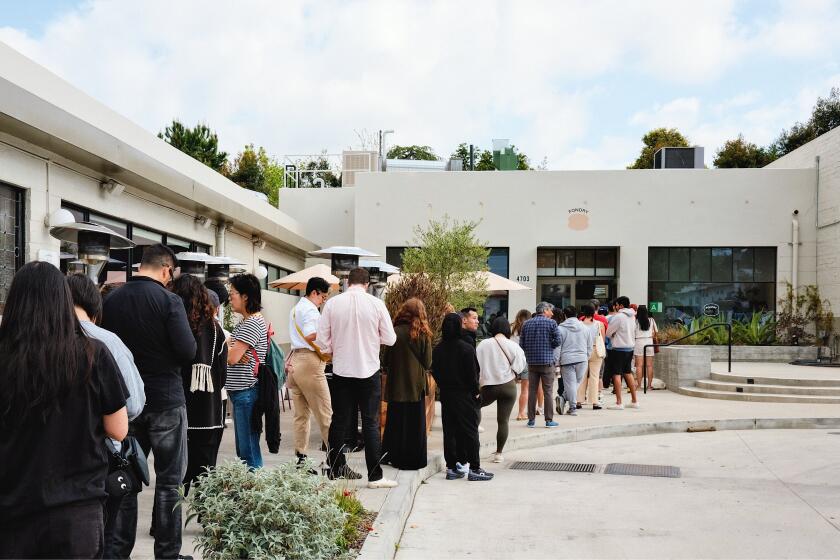Review: At Pot in Koreatown, Roy Choi’s still messing with expectations

Roy Choi has gone through a lot in the last few years, and his journey — from a chef ingloriously fired from a high-profile restaurant to food truck pioneer to baron of a restaurant empire — has been much celebrated lately.
His cookbook and memoir, “L.A. Son,” is a bestseller. His talk on a chef’s responsibility to his community moved René Redzepi’s Mad conference (“mad” means “food” in Danish) in Copenhagen last fall. In the events surrounding the film “Chef” this spring, it is hard to know whether the bigger draw was Choi, a co-producer, or Jon Favreau, who directed and starred. Laid-back, a little surly and genuinely funny, Choi has become the current archetype of the L.A. chef, which is pretty good for a guy whose most famous dish is still a Korean taco served from a truck.
If you were opening a hip Koreatown hotel, Choi might be an obvious choice, especially if it were the kind of place with a DJ in the lobby and a bar that looks like a “Doctor Who” prop, weirdly good free Wi-Fi and a Korean-style coffee-and-pastry bar that could have been transplanted straight from the hippest office building in Gangnam-gu. Choi likes old-school hip-hop, funky lighting and wild-style mural art, and his taste is fresher than anything you’ll experience these days at the Ace or the Standard hotel.
But where you might expect Pot, his new restaurant in the Line hotel, to be a hipster joint, dishing out sleekly reimagined Korean fusion food to a generation whose first exposure to celebrity-cooked food may have been his Black Jack quesadillas, it is kind of a regular Korean place, home to bubbling tureens of crab soup and sizzling kimchi-fried rice, super-clean bowls of cold noodles with chile sauce and Korean pickles, and crisp potato pancakes like the ones you get at Kobawoo. He’s still messing with expectations, but unless you happen to be a middle-aged Korean guy incensed at having to pay two bucks for kimchi and $3 for the wonderful pickled sea beans with sesame, the expectations that he’s messing with are probably not your own.
You enter the restaurant through a narrow, dark passageway lighted only with a neon “Pot” in the exact shade of the signs marking medical marijuana clinics, and you stumble into a wide, brightly lighted dining room that looks a little like a converted hospital cafeteria — low tile ceilings, glass-front counters and all. Bowls, chopsticks and metal water cups are hidden in cubbyholes set into each of the long tables. A plastic pitcher of iced barley tea sweats on each table as it would in any basic Koreatown restaurant. Big steel bowls of seafood soup, cabbage stew with tofu and doenjang, and pork intestine with gaennip seethe on tabletop induction burners — you can get the pots in sizes meant to serve two or 10.
Pot is a new restaurant in a chic hotel, but it is meant to resemble a faded high-volume joint in an unfashionable neighborhood of Seoul, and it is hard not to wonder whether the designers intentionally half-killed the ferns before they plunked them into pots, or if the thin cotton bibs provided for the customers were custom-sewn or gathered from a $1.99 rack. What you imagine to be smudges on the walls turn out to be lovingly rendered flowers and leaves. The tall glasses of whiskey on half the tables turn out to be glasses of iced soju rather artfully flavored with kimchi or Indian curry.
The bareness of the restaurant, the pounding gangsta rap and the menu of unreconstructed Korean stews speaks to an extremely specific Koreatown experience. Choi charges a couple of bucks for kimchi instead of giving it away. He makes his customers order vast tureens of Boot Knocker if they want budae jjigae, the spicy brew of hot dogs, Spam, canned corned beef and Vienna sausages sometimes called “military stew,” because so many of its ingredients were supposedly once cadged from the U.S. Army base in Seoul. The short-rib stew galbi jjim, sweetened with chestnuts and dates, becomes Shorty; a slightly tamer version of the spicy crab soup you might find at one of the Korean seafood restaurants on the Redondo Beach pier becomes just “Redondo Beach” on the list of hot pots.
Sometimes the aggressively non-Korean nomenclature can backfire. K-town Caviar you expect to be something odd, so the creamy pollock roe with daikon does not come as a surprise. The sizzling, citrus-scented Santa Barbara spot prawns that show up when you order the Live From the Santa Barbara Bowl are about right. BBQ Spicy Pork is just that, and a pretty big heap of it too.
But when you order something called Dang Son and discover that you’re getting a solid half-gallon of something resembling the street-food classic tteokbokki, thick rice noodles with fish cake in a kind of sweet chile sauce, or that Rooster Sauce turns out to be more of a soup than a thick stew, it can be discomfiting. The occasional menu difficulties, in fact, are pretty close to what you might experience at a local bar like DGM, where you try to navigate an untranslated Korean menu. It’s confusing. It’s fun. You’ll go home with a lot of leftovers.
The Beep Beep, the closest thing to a must-order here, is like the mayonnaise-y sushi-bar classic dynamite, amplified with fresh sea urchin, layered over a bowl of hot rice.
Somebody’s having a good time — everybody’s having a good time — but a Koreatown habitué will tell you where to find more fully realized versions of many of the dishes, elsewhere in the area — meatier short-rib stew at Seongbukdong, spicier crab soup at Ondal 2, silkier tofu stew at So Kong Dong or perfect marinated raw crab at Soban. (However, the chewy whole fried fish, the pickled sea beans and the grilled vegetables may be the best in Koreatown.)
But this is Choi’s homage to the broad L.A. Korean American food universe in which he was raised; it is raucous, and it is vital and engaging in a way that even the best of the more sedate specialists can never be. Pot isn’t a careful re-creation of a Seoul buljip. It is a sizzling, loving creature of Koreatown L.A.
Follow me on Twitter @thejgold
Pot
Authentic? To Los Angeles’ vibrant Koreatown, it is.
ADDRESS
In the Line Hotel, 3515 Wilshire Blvd., Los Angeles, (213) 368-3030, eatatpot.com
PRICES
Banchan, $2-$8; smaller plates, $$9-$22; pots for two, $22-$40.
DETAILS
Open 11 a.m. to 11 p.m. daily. Credit cards accepted. Full bar. Valet parking.
RECOMMENDED DISHES
Pickled sea beans with sesame, uni dynamite bowl, fried fish, potato pancake, “Redondo Beach” crab pot.
More to Read
Eat your way across L.A.
Get our weekly Tasting Notes newsletter for reviews, news and more.
You may occasionally receive promotional content from the Los Angeles Times.







